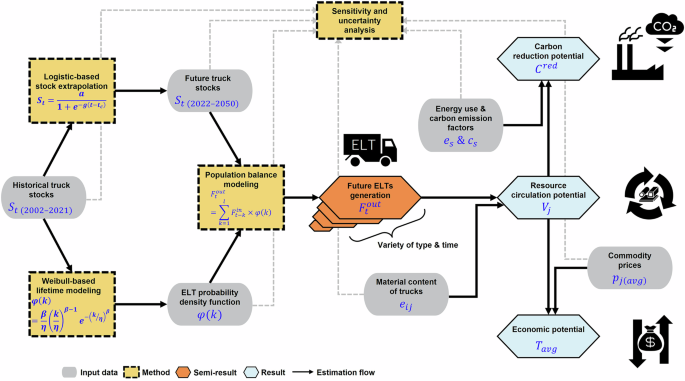Lorek, S. & Spangenberg, J. H. Sustainable consumption within a sustainable economy–beyond green growth and green economies. J. Clean. Prod. 63, 33–44 (2014).
Google Scholar
Rogelj, J. et al. Paris Agreement climate proposals need a boost to keep warming well below 2 C. Nature 534, 631–639 (2016).
Google Scholar
Sachs, J. D., Schmidt-Traub, G., Mazzucato, M., Messner, D. & Nakicenovic, N. Rockström J. Six transformations to achieve the sustainable development goals. Nat. Sustain. 2, 805–814 (2019).
Google Scholar
Enhancing circular economy as a contribution to achieving sustainable consumption and production. UNEP (2022).
Friant, M. C., Vermeulen, W. J. & Salomone, R. Analysing European Union circular economy policies: words versus actions. Sustain. Prod. Consum. 27, 337–353 (2021).
Google Scholar
Zhu, J., Fan, C., Shi, H. & Shi, L. Efforts for a circular economy in China: A comprehensive review of policies. J. Ind. Ecol. 23, 110–118 (2019).
Google Scholar
Herrador, M., De Jong, W., Nasu, K. & Granrath, L. Circular economy and zero-carbon strategies between Japan and South Korea: A comparative study. Sci. Total Environ. 820, 153274 (2022).
Google Scholar
Xiong, X., Zhao, L., Xu, G. & Zeng, X. The Evolution of Neodymium Cycle, Urban Minerals, and Trade in China. Journal of Sustainability 1, 1–16 (2025).
Google Scholar
Zeng, X. & Xiong, X. Economic Performance of Urban Mining for Future Resource Supply. In: The Oxford Handbook on the Greening of Economic Development. (Oxford University Press, 2025).
Zeng, X., Mathews, J. A. & Li, J. Urban mining of e-waste is becoming more cost-effective than virgin mining. Environ. Sci. Technol. 52, 4835–4841 (2018).
Google Scholar
Arora, M., Raspall, F., Fearnley, L. & Silva, A. Urban mining in buildings for a circular economy: Planning, process and feasibility prospects. Resour. Conserv. Recycl. 174, 105754 (2021).
Google Scholar
Boxall, N. J. et al. Urban mining of lithium-ion batteries in Australia: Current state and future trends. Miner. Eng. 128, 45–55 (2018).
Google Scholar
Funari, V., Toller, S., Vitale, L., Santos, R. M. & Gomes, H. I. Urban mining of municipal solid waste incineration (MSWI) residues with emphasis on bioleaching technologies: a critical review. Environ. Sci. Pollut. Res. 30, 59128–59150 (2023).
Google Scholar
Zhang, L., Zhong, Y. & Geng, Y. A bibliometric and visual study on urban mining. J. Clean. Prod. 239, 118067 (2019).
Google Scholar
Xue, Y., Bressers, H. & Wen, Z. A massive urban symbiosis: a preliminary review of the urban mining pilot base programme in China. Towards Zero Waste: Circular Economy Boost, Waste to Resources, 121–143 (2018).
Hao, H. et al. Impact of transport electrification on critical metal sustainability with a focus on the heavy-duty segment. Nat. Commun. 10, 5398 (2019).
Google Scholar
Xu, X., Chase, N. & Peng, T. Economic structural change and freight transport demand in China. Energy Policy 158, 112567 (2021).
Google Scholar
Hao, H., Geng, Y., Li, W. & Guo, B. Energy consumption and GHG emissions from China’s freight transport sector: scenarios through 2050. Energy Policy 85, 94–101 (2015).
Google Scholar
Song, L. et al. China’s bulk material loops can be closed but deep decarbonization requires demand reduction. Nat. Clim. Change 13, 1136–1143 (2023).
Google Scholar
Zeng, X., Ali, S. H., Tian, J. & Li, J. Mapping anthropogenic mineral generation in China and its implications for a circular economy. Nat. Commun. 11, 1544 (2020).
Google Scholar
De Oliveira Neto, G. C., Vendrametto, O., Naas, I. A., Palmeri, N. L. & Lucato, W. C. Environmental impact reduction as a result of cleaner production implementation: a case study in the truck industry. J. Clean. Prod. 129, 681–692 (2016).
Google Scholar
Toktarova, A., Walter, V., Göransson, L. & Johnsson, F. Interaction between electrified steel production and the north European electricity system. Appl. Energy 310, 118584 (2022).
Google Scholar
Shao, S., Liu, J., Geng, Y., Miao, Z. & Yang, Y. Uncovering driving factors of carbon emissions from China’s mining sector. Appl. Energy 166, 220–238 (2016).
Google Scholar
Reck, B. K. & Graedel, T. E. Challenges in metal recycling. Science 337, 690–695 (2012).
Google Scholar
Dunn, J. B., Gaines, L., Sullivan, J. & Wang, M. Q. Impact of recycling on cradle-to-gate energy consumption and greenhouse gas emissions of automotive lithium-ion batteries. Environ. Sci. Technol. 46, 12704–12710 (2012).
Google Scholar
Bringezu, S., Schütz, H., Steger, S. & Baudisch, J. International comparison of resource use and its relation to economic growth: The development of total material requirement, direct material inputs and hidden flows and the structure of TMR. Ecol. Econ. 51, 97–124 (2004).
Google Scholar
Kosai, S. & Yamasue, E. Global warming potential and total material requirement in metal production: Identification of changes in environmental impact through metal substitution. Sci. Total Environ. 651, 1764–1775 (2019).
Google Scholar
Henckens, M., Driessen, P. & Worrell, E. Metal scarcity and sustainability, analyzing the necessity to reduce the extraction of scarce metals. Resour. Conserv. Recycl. 93, 1–8 (2014).
Google Scholar
Nag, U., Sharma, S. K. & Govindan, K. Investigating drivers of circular supply chain with product-service system in automotive firms of an emerging economy. J. Clean. Prod. 319, 128629 (2021).
Google Scholar
Hertwich, E. G. et al. Material efficiency strategies to reducing greenhouse gas emissions associated with buildings, vehicles, and electronics—a review. Environ. Res. Lett. 14, 043004 (2019).
Google Scholar
Zhang, L. et al. Collaborative approach for environmental and economic optimization based on life cycle assessment of end-of-life vehicles’ dismantling in China. J. Clean. Prod. 276, 124288 (2020).
Google Scholar
Raimi, M. O. et al. Leaving no one behind: impact of soil pollution on biodiversity in the global south: a global call for action. In: Biodiversity in Africa: potentials, threats and conservation. Springer (2022).
Sakai, S. et al. An international comparative study of end-of-life vehicle (ELV) recycling systems. J. Mater. Cycles Waste Manag. 16, 1–20 (2014).
Google Scholar
Sato, F. E. K., Furubayashi, T. & Nakata, T. Application of energy and CO2 reduction assessments for end-of-life vehicles recycling in Japan. Appl. Energy 237, 779–794 (2019).
Google Scholar
Yu, Z., Tianshan, M., Rehman, S. A., Sharif, A. & Janjua, L. Evolutionary game of end-of-life vehicle recycling groups under government regulation. Clean Technol. Environ. Policy 25, 1473–1484 (2023).
Google Scholar
Karagoz, S., Aydin, N. & Simic, V. End-of-life vehicle management: A comprehensive review. J. Mater. Cycles Waste Manag. 22, 416–442 (2020).
Google Scholar
Sun, J. & Xiao, Z. Channel selection for automotive parts remanufacturer under government replacement-subsidy. Eur. J. Ind. Eng. 12, 808–831 (2018).
Google Scholar
Gan, J. & Luo, L. Using DEMATEL and intuitionistic fuzzy sets to identify critical factors influencing the recycling rate of end-of-life vehicles in China. Sustainability 9, 1873 (2017).
Google Scholar
Zhou, F., Lim, M. K., He, Y., Lin, Y. & Chen, S. End-of-life vehicle (ELV) recycling management: Improving performance using an ISM approach. J. Clean. Prod. 228, 231–243 (2019).
Google Scholar
Qiao, D., Wang, G., Gao, T., Wen, B. & Dai, T. Potential impact of the end-of-life batteries recycling of electric vehicles on lithium demand in China: 2010–2050. Sci. Total Environ. 764, 142835 (2021).
Google Scholar
Li, Y. et al. The potential and trend of end-of-life passenger vehicles recycling in China. Sustainability 12, 1455 (2020).
Google Scholar
Ohno, H. et al. Optimal recycling of steel scrap and alloying elements: input-output based linear programming method with its application to end-of-life vehicles in Japan. Environ. Sci. Technol. 51, 13086–13094 (2017).
Google Scholar
Xu, G., Yano, J. & Sakai, S. Recycling potentials of precious metals from end-of-life vehicle parts by selective dismantling. Environ. Sci. Technol. 53, 733–742 (2018).
Google Scholar
Restrepo, E. et al. Stocks, flows, and distribution of critical metals in embedded electronics in passenger vehicles. Environ. Sci. Technol. 51, 1129–1139 (2017).
Google Scholar
Andersson, M., Söderman, M. L. & Sandén, B. A. Are scarce metals in cars functionally recycled? Waste Manag 60, 407–416 (2017).
Google Scholar
Li, Y., Liu, Y., Chen, Y., Huang, S. & Ju, Y. Projection of end-of-life vehicle population and recyclable metal resources: Provincial-level gaps in China. Sustain. Prod. Consum. 31, 818–827 (2022).
Google Scholar
Tan, Q., Li, J., Yang, L. & Xu, G. Cascade use potential of retired traction batteries for renewable energy storage in China under carbon peak vision. J. Clean. Prod. 412, 137379 (2023).
Google Scholar
Liu, M. et al. End-of-life passenger vehicles recycling decision system in China based on dynamic material flow analysis and life cycle assessment. Waste Manag 117, 81–92 (2020).
Google Scholar
China is ‘certain’ to have overtaken Japan as the world’s top auto exporter in 2023. In: CNN (2024).
Li, J., Yu, K. & Gao, P. Recycling and pollution control of the End of Life Vehicles in China. J. Mater. Cycles Waste Manag. 16, 31–38 (2014).
Google Scholar
Wang, J. et al. Institutional, technology, and policies of end-of-life vehicle recycling industry and its indication on the circular economy-comparative analysis between China and Japan. Front. Sustain. 2, 645843 (2021).
Google Scholar
Eheliyagoda, D., Xiong, X. & Zeng, X. The Position of China in Neodymium Utilization: Trend and Challenges. ACS Sustainable Resour. Manage. 1, 2621–2629 (2024).
Google Scholar
Qiao, Q., Zhao, F., Liu, Z. & Hao, H. Electric vehicle recycling in China: Economic and environmental benefits. Resour. Conserv. Recycl. 140, 45–53 (2019).
Google Scholar
Fatimah, Y. A., Govindan, K., Murniningsih, R. & Setiawan, A. Industry 4.0 based sustainable circular economy approach for smart waste management system to achieve sustainable development goals: A case study of Indonesia. J. Clean. Prod. 269, 122263 (2020).
Google Scholar
Safder, U., Tariq, S. & Yoo, C. Multilevel optimization framework to support self-sustainability of industrial processes for energy/material recovery using circular integration concept. Appl. Energy 324, 119685 (2022).
Google Scholar
Graedel, T. E. et al. What do we know about metal recycling rates? J. Ind. Ecol. 15, 355–366 (2011).
Google Scholar
Zhang, L. & Xu, Z. A critical review of material flow, recycling technologies, challenges and future strategy for scattered metals from minerals to wastes. J. Clean. Prod. 202, 1001–1025 (2018).
Google Scholar
Bui, T. D., Tseng, J. W., Tseng, M. L. & Lim, M. K. Opportunities and challenges for solid waste reuse and recycling in emerging economies: A hybrid analysis. Resour. Conserv. Recycl. 177, 105968 (2022).
Google Scholar
Nuss, P. & Eckelman, M. J. Life cycle assessment of metals: a scientific synthesis. PloS one 9, e101298 (2014).
Google Scholar
Sun, Z., Xiao, Y., Agterhuis, H., Sietsma, J. & Yang, Y. Recycling of metals from urban mines–a strategic evaluation. J. Clean. Prod. 112, 2977–2987 (2016).
Google Scholar
Vélez-Henao, J. A. & Pauliuk, S. Material requirements of decent living standards. Environ. Sci. Technol. 57, 14206–14217 (2023).
Google Scholar
Kosai, S., Matsui, K., Matsubae, K., Yamasue, E. & Nagasaka, T. Natural resource use of gasoline, hybrid, electric and fuel cell vehicles considering land disturbances. Resour. Conserv. Recycl. 166, 105256 (2021).
Google Scholar
Dong, H. et al. Achieving carbon emission reduction through industrial & urban symbiosis: A case of Kawasaki. Energy 64, 277–286 (2014).
Google Scholar
Mallick P. K. Materials, design and manufacturing for lightweight vehicles. Woodhead publishing (2020).
Jirang, C. & Roven, H. J. Recycling of automotive aluminum. Transactions of Nonferrous Metals Society of China 20, 2057–2063 (2010).
Google Scholar
Assessment of Aluminium Usage in China’s Automobile Industry 2016-2030. IAI (2019).
Ou, S. et al. China’s vehicle electrification impacts on sales, fuel use, and battery material demand through 2050: Optimizing consumer and industry decisions. Iscience 24, (2021).
Saidani, M., Yannou, B., Leroy, Y. & Cluzel, F. Dismantling, remanufacturing and recovering heavy vehicles in a circular economy—Technico-economic and organisational lessons learnt from an industrial pilot study. Resour. Conserv. Recycl. 156, 104684 (2020).
Google Scholar
China. National Bureau of Statistics. https://data.stats.gov.cn/easyquery.htm?cn=C01.
Zeng, X., Ali, S. H. & Li, J. Estimation of waste outflows for multiple product types in China from 2010–2050. Scientific Data 8, 15 (2021).
Google Scholar
London Metal Exchange https://www.lme.com.
Asmatulu, E., Twomey, J. & Overcash, M. Evaluation of recycling efforts of aircraft companies in Wichita. Resour. Conserv. Recycl. 80, 36–45 (2013).
Google Scholar
Song, L. & Chen, W. Stocks and flows of steel in automobiles, vessels and household appliances in China. Nat. Resour. J. 35, 895–907 (2020).
Cramer J. S. The origins of logistic regression. Tinbergen Institute discussion paper (2002).
Nakatani, J. & Moriguchi, Y. Time-series product and substance flow analyses of end-of-life electrical and electronic equipment in China. Waste Manag 34, 489–497 (2014).
Google Scholar
Kuong, I. H., Li, J., Zhang, J. & Zeng, X. Estimating the evolution of urban mining resources in Hong Kong, up to the year 2050. Environ. Sci. Technol. 53, 1394–1403 (2019).
Google Scholar
Araujo, M. G., Magrini, A., Mahler, C. F. & Bilitewski, B. A model for estimation of potential generation of waste electrical and electronic equipment in Brazil. Waste Manag 32, 335–342 (2012).
Google Scholar
Mmereki, D., Li, B. & Wang, L. Estimation of waste electronic and electrical equipment arising in Botswana-A case study of Gaborone City. Int. J. Environ. Sci. 3, 441–452 (2012).
Google Scholar
Yedla, S. Development of a methodology for electronic waste estimation: A material flow analysis-based SYE-Waste Model. Waste Manag. Res. 34, 81–86 (2016).
Google Scholar
Wang, F., Huisman, J., Stevels, A. & Baldé, C. P. Enhancing e-waste estimates: Improving data quality by multivariate Input–Output Analysis. Waste Manag 33, 2397–2407 (2013).
Google Scholar
Zhang, L., Lu, Q., Yuan, W., Jiang, S. & Wu, H. Characterizing end-of-life household vehicles’ generations in China: Spatial-temporal patterns and resource potentials. Resour. Conserv. Recycl. 177, 105979 (2022).
Google Scholar
Gómez, M. et al. Navigating the future: China’s photovoltaic roadmap challenges. Sci. Bull. 68, 2491–2494 (2023).
Google Scholar
Ramkrishna, D. & Mahoney, A. W. Population balance modeling. Promise for the future. Chem. Eng. Sci. 57, 595–606 (2002).
Google Scholar
Müller, D. B. Stock dynamics for forecasting material flows—Case study for housing in The Netherlands. Ecol. Econ. 59, 142–156 (2006).
Google Scholar
Sartori, I., Sandberg, N. H. & Brattebø, H. Dynamic building stock modelling: General algorithm and exemplification for Norway. Energy and Buildings 132, 13–25 (2016).
Google Scholar
Wiedenhofer, D., Fishman, T., Lauk, C., Haas, W. & Krausmann, F. Integrating material stock dynamics into economy-wide material flow accounting: concepts, modelling, and global application for 1900–2050. Ecol. Econ. 156, 121–133 (2019).
Google Scholar
Lauinger, D., Billy, R. G., Vásquez, F. & Müller, D. B. A general framework for stock dynamics of populations and built and natural environments. J. Ind. Ecol. 25, 1136–1146 (2021).
Google Scholar
Lin, M. et al. Response to the upcoming emerging waste: necessity and feasibility analysis of photovoltaic waste recovery in China. Environ. Sci. Technol. 56, 17396–17409 (2022).
Google Scholar
Nakamoto, Y., Tokito, S. & Kito, M. Impact of vehicle electrification on global supply chains and emission transfer. Environ. Res. Lett. 18, 054021 (2023).
Google Scholar
Yao, P. et al. The role of nickel recycling from nickel-bearing batteries on alleviating demand-supply gap in China’s industry of new energy vehicles. Resour. Conserv. Recycl. 170, 105612 (2021).
Google Scholar
Ziemann, S., Müller, D. B., Schebek, L. & Weil, M. Modeling the potential impact of lithium recycling from EV batteries on lithium demand: A dynamic MFA approach. Resour. Conserv. Recycl. 133, 76–85 (2018).
Google Scholar
Li, W., Bai, H., Yin, J. & Xu, H. Life cycle assessment of end-of-life vehicle recycling processes in China—take Corolla taxis for example. J. Clean. Prod. 117, 176–187 (2016).
Google Scholar
Quinkertz, R., Rombach, G. & Liebig, D. A scenario to optimise the energy demand of aluminium production depending on the recycling quota. Resour. Conserv. Recycl. 33, 217–234 (2001).
Google Scholar
Watari, T., Cabrera Serrenho, A., Gast, L., Cullen, J. & Allwood, J. Feasible supply of steel and cement within a carbon budget is likely to fall short of expected global demand. Nat. Commun. 14, 7895 (2023).
Google Scholar
Xiong, X. et al. China’s recycling potential of large-scale public transport vehicles and its implications. Comm. Eng. 2, 56 (2023).
Google Scholar
Islam, M. T. & Huda, N. Assessing the recycling potential of “unregulated” e-waste in Australia. Resour. Conserv. Recycl. 152, 104526 (2020).
Google Scholar








